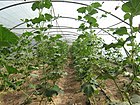Note: This is a project under development. The articles on this wiki are just being initiated and broadly incomplete. You can Help creating new pages.
Difference between revisions of "Lagenaria siceraria"
| Line 11: | Line 11: | ||
==Common names== | ==Common names== | ||
| − | {{Common names|sa=|en=|gu=|hi=|kn=|ks=|ml=|mr=|pa=|ta=|te=}} | + | {{Common names|sa=Tiktalabu|en=Bottle Gourd|gu=Tumada|hi=Lauki|kn=Sorekayi|ks=|ml=Pechura|mr=Dudhi|pa=|ta=Surakkai|te=Sorakkaya}} |
==Properties== | ==Properties== | ||
Latest revision as of 13:29, 29 May 2020
Bottle gourd is a vigorous, annual climbing plant, producing stems about 9 metres long. The stems scramble over the ground and into the surrounding vegetation, attaching themselves to the plants by means of tendrils that grow out of the leaf axils.
Contents
- 1 Uses
- 2 Parts Used
- 3 Chemical Composition
- 4 Common names
- 5 Properties
- 6 Habit
- 7 Identification
- 8 List of Ayurvedic medicine in which the herb is used
- 9 Where to get the saplings
- 10 Mode of Propagation
- 11 How to plant/cultivate
- 12 Commonly seen growing in areas
- 13 Photo Gallery
- 14 References
- 15 External Links
Uses
headaches, Typhus, Stomach acidity, Indigestion, Ulcers, Boils, Aching teeth, Gums.[1]
Parts Used
Immature fruit, Seeds, Young shoots, Leaves.
Chemical Composition
Common names
| Language | Common name |
|---|---|
| Kannada | Sorekayi |
| Hindi | Lauki |
| Malayalam | Pechura |
| Tamil | Surakkai |
| Telugu | Sorakkaya |
| Marathi | Dudhi |
| Gujarathi | Tumada |
| Punjabi | |
| Kashmiri | |
| Sanskrit | Tiktalabu |
| English | Bottle Gourd |
Properties
Reference: Dravya - Substance, Rasa - Taste, Guna - Qualities, Veerya - Potency, Vipaka - Post-digesion effect, Karma - Pharmacological activity, Prabhava - Therepeutics.
Dravya
Rasa
Guna
Veerya
Vipaka
Karma
Prabhava
Habit
Identification
Leaf
| Kind | Shape | Feature |
|---|---|---|
Flower
| Type | Size | Color and composition | Stamen | More information |
|---|---|---|---|---|
| {{{5}}} |
Fruit
| Type | Size | Mass | Appearance | Seeds | More information |
|---|---|---|---|---|---|
Other features
List of Ayurvedic medicine in which the herb is used
Where to get the saplings
Mode of Propagation
How to plant/cultivate
A plant of the moist, lowland tropics and subtropics. It can be grown at elevations up to 1,600 metres, but economic crops are only produced below 500 metres.[4]
Commonly seen growing in areas
[[:Category:Herbs that are commonly seen in the region of |]], [[:Category:Herbs that are commonly seen in the region of |]], [[:Category:Herbs that are commonly seen in the region of |]], [[:Category:Herbs that are commonly seen in the region of |]], [[:Category:Herbs that are commonly seen in the region of |]].
Photo Gallery
References
- ↑ Indian Medicinal Plants by C.P.Khare
- ↑ [Chemistry]
- ↑ [Morphology]
- ↑ Cultivation
External Links
- Ayurvedic Herbs known to be helpful to treat headaches
- Ayurvedic Herbs known to be helpful to treat Typhus
- Ayurvedic Herbs known to be helpful to treat Stomach acidity
- Ayurvedic Herbs known to be helpful to treat Indigestion
- Ayurvedic Herbs known to be helpful to treat Ulcers
- Ayurvedic Herbs known to be helpful to treat Boils
- Ayurvedic Herbs known to be helpful to treat Aching teeth
- Ayurvedic Herbs known to be helpful to treat Gums
- Herbs with Immature fruit used in medicine
- Herbs with Seeds used in medicine
- Herbs with Young shoots used in medicine
- Herbs with Leaves used in medicine
- Herbs with common name in Kannada
- Herbs with common name in Hindi
- Herbs with common name in Malayalam
- Herbs with common name in Tamil
- Herbs with common name in Telugu
- Herbs with common name in Marathi
- Herbs with common name in Gujarathi
- Herbs with common name in Sanskrit
- Herbs with common name in English
- Habit - Annual climber
- Index of Plants which can be propagated by Seeds
- Herbs that are commonly seen in the region of
- Herbs
- Pages without herbs images




